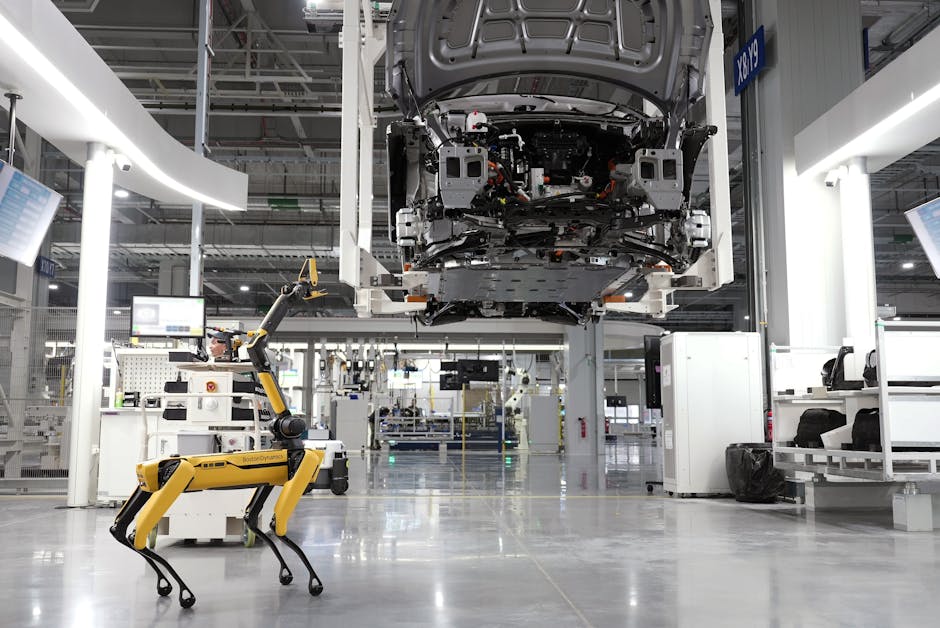Revolutionizing Industrial Productivity: How Collaborative Cloud-Based AI Drives Unprecedented Gains And Competitive Edge By 2035

The AI Transformation in Industrial Labs: A Deep Dive into a More Efficient Future
The rapid integration of Artificial Intelligence (AI) across various sectors has heralded a new era in industrial productivity and operational efficiency. Particularly within cloud-based industrial labs, AI's impact is profound, reshaping traditional manufacturing landscapes into dynamic environments where technology drives competitive advantage. As we stand on the brink of 2025, understanding this evolution is crucial for any industry leader looking to navigate the fast-approaching future of manufacturing.
Decoding the Growth of AI in Manufacturing
Market Expansion: The trajectory of AI adoption in manufacturing is nothing short of spectacular. From a substantial market size of $7.6 billion projected for 2025, the sector is expected to balloon to $62.33 billion by 2032. This explosive growth signifies a paradigm shift in how industries perceive and integrate AI technologies. On the forefront, edge AI, with its promise to enhance real-time operations at the device level, is poised to reach a market size of $66.47 billion by 2030, achieving a robust 21.7% CAGR from 2025.
Enhancing Productivity Through AI
Labor Efficiency: The implementation of AI tools has propelled labor productivity to levels 4.8 times the global average, showcasing AI's critical role in enhancing human performance. Companies leveraging generative AI have witnessed a 33% increase in productivity during operational hours, a testament to AI’s transformative capability in streamlining tasks and decision-making processes.
Operational Efficiency & Return on Investment
Cost Reduction and Process Optimization: AI’s role extends beyond just productivity; it significantly reduces operational costs and enhances efficiency. About 72% of manufacturers have reported noticeable cost reductions due to AI integration. Moreover, the adoption of generative AI has yielded a 3.4x ROI by accelerating design processes and prototype development, proving that AI implementation is not just beneficial but essential for staying competitive.
Real-world Applications in the Spotlight
Digital Twins & Enhanced Vision: In today's AI-driven labs, digital twins and advanced simulation techniques are used to foresee failures and optimize workflow efficiencies, which substantially minimizes downtime and mitigates quality control issues. Meanwhile, AI-driven computer vision systems offer unprecedented defect detection capabilities, far surpassing human accuracy and efficiency.
As AI continues to evolve, the potential for it to handle more complex and sensitive tasks increases, thereby not just supporting but revolutionizing workflows.
Competitive Risks and Strategic Opportunities
The swift adoption of collaborative, cloud-based AI solutions provides substantial competitive advantages in terms of margin, throughput, and agility. However, organizations that delay this adoption risk falling behind in efficiency and innovation cycles. Industry experts from renowned firms like PwC and McKinsey uniformly agree that digital transformation through AI is crucial for sustained performance and resilience in future industrial operations.
Looking to the Future: AI's Strategic Relevance
The future landscape of industrial operations will be significantly shaped by AI technologies. With projected productivity gains of up to 40% and enhancements in skill transformation and workforce efficiency, AI not only promises to refine current practices but also to redefine the very nature of manufacturing work. As we move towards a more interconnected and automated world, the strategic integration of AI within industrial frameworks is not just advisable; it’s imperative.
In conclusion, as the industrial sector continues to evolve under the influence of AI, leaders must not only adapt to but also anticipate and shape these changes. Embracing AI is no longer a matter of choice but a prerequisite for future-proofing operations and achieving sustained competitive success in the burgeoning landscape of smart manufacturing.
Explore more about AI in manufacturing on Classic Informatics and Aristek Systems.
